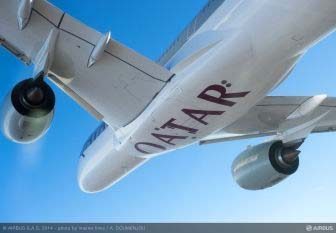
Taking into account lower global oil prices, Qatar’s national carrier will reduce the cost of flying on airline this year, the company’s CEO has said.
Speaking to reporters today, Akbar Al Baker said that the national carrier plans to cut the fuel surcharge that is added to passenger tickets in response to falling oil prices, but won’t cut its base fares. He didn’t hint at the size of the reduction, or when exactly it would come into effect.
Currently, the fuel surcharge appears to make up nearly 18 percent of the total fare on a one-way ticket, purchased a month in advance, from Doha to London, according to Qatar Airways’ website. Passengers pay a surcharge of QR460 (US$126) as part of their QR2,580 ($709) ticket.

Al Baker made the announcement in response to a question at a press conference marking the delivery of the inaugural Airbus A350.
Qatar Airways is the first carrier to receive the wide-bodied aircraft, which is expected to be 25 percent more fuel efficient than comparable long-range planes.
The A350 is scheduled to make its commercial debut next week flying from Doha to Frankfurt.
As Qatar Airways takes delivery of additional planes, Al Baker said the carrier plans to use A350s on flights to New York, secondary European cities, east Asia and the Indian subcontinent. The aircraft will be taking the place of A330s and Boeing 787s on these routes.
Safety
During the wide-ranging press conference, Al Baker also said that Qatar Airways is working with an unnamed supplier to develop technology that continuously transmits information recorded by a plane’s flight data recorder, or “black box,” to monitors on the ground.

Such devices could speed up the time it takes to investigate plane crashes, as well as possibly alert officials when a plane is deviating from its standard operations and is in trouble.
Al Baker’s comments come as the aviation industry grapples with the loss of Air Asia flight QZ8501, which crashed into the Java Sea on Dec. 28 while traveling from the Indonesian city of Surabaya to Singapore.
The cause of the crash, which is believed to have killed all 162 passengers and crew members on board, is still not known more than a week after the incident. Earlier today, searches said they had found a piece of the plane’s tail section where the recorders are housed.
While Al Baker said that Qatar Airways would be the first carrier to introduce the transmitting technology on all its aircraft, other airlines have installed separate data-streaming devices on its planes.
Canadian regional carrier First Air, for example, uses technology that sends updates from the cockpit to the ground every five to 10 minutes on a normal flight and is capable of streaming data every second if a plane deviates from its flight path, according to a recent CNN report.
Aviation experts told the news network that so far, major carriers have been slow to adopt the technology primarily because of the cost involved.
Thoughts?







